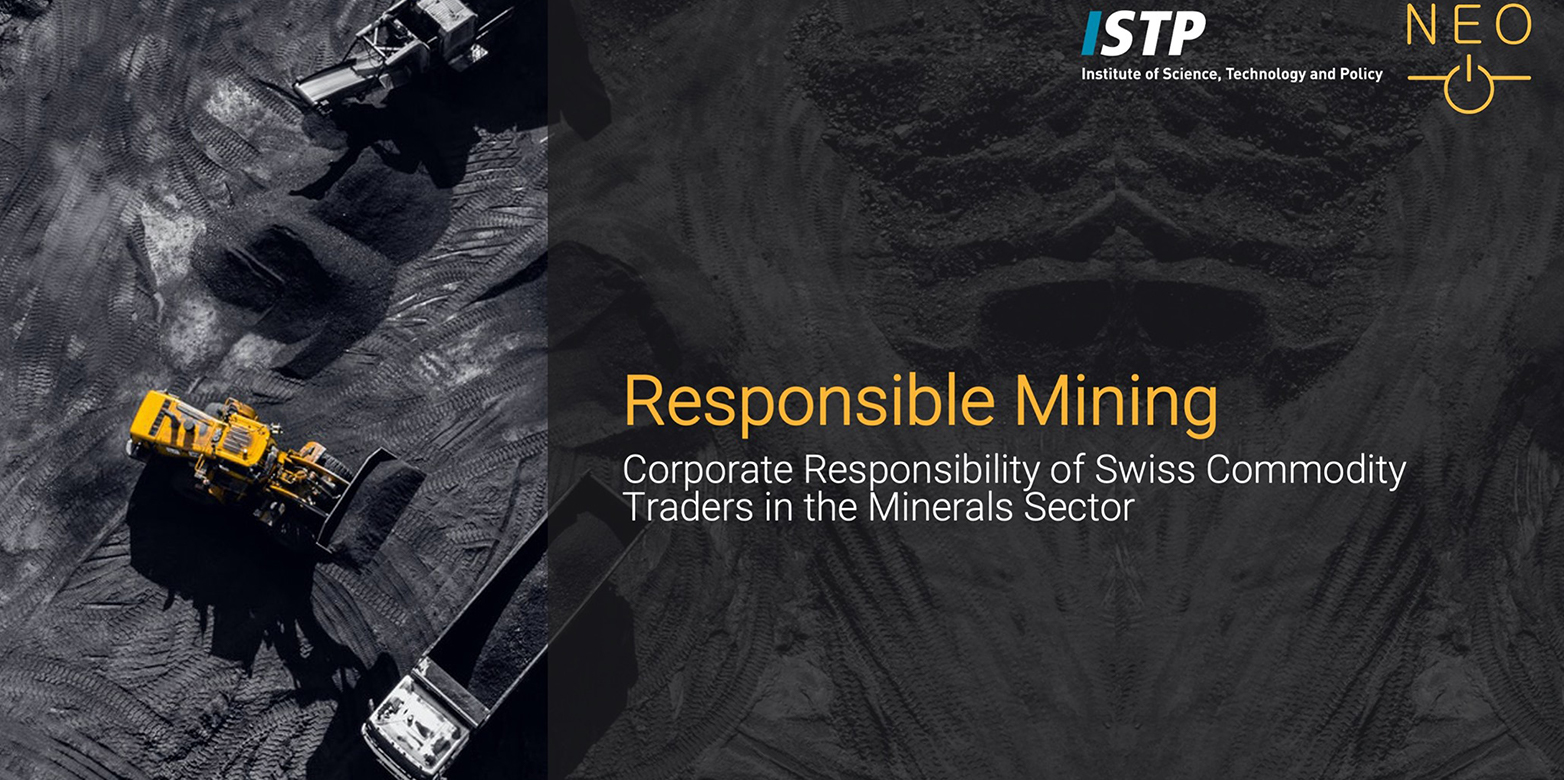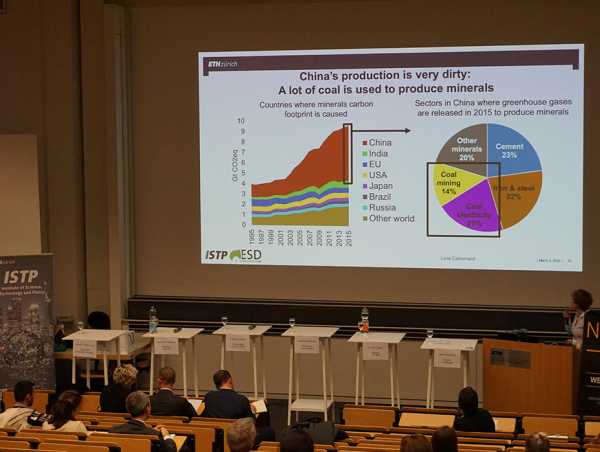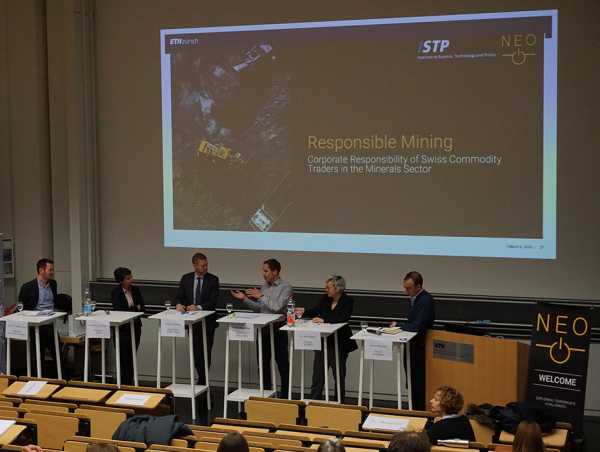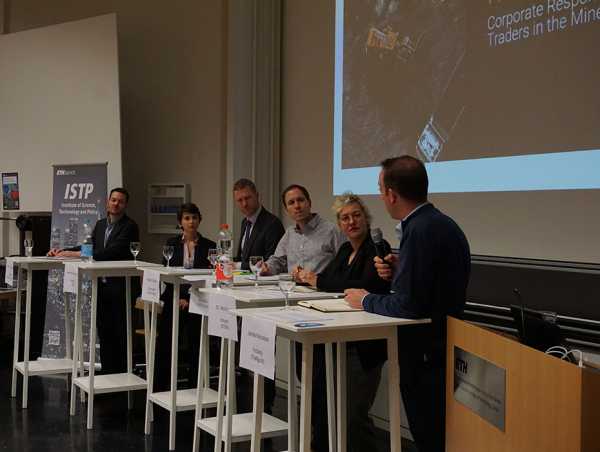Reflecting on the NEO/ISTP Panel Discussion on 4 March 2020: Corporate Responsibility in the Minerals Sector
Minerals constitute the essential raw materials to sustain the present-day civilization. We need coal for energy, iron ore for steel and various other minerals for many other essentials. Mining of such minerals however, has major effects on the natural and social environment. This panel gave insights into the minerals trade of Switzerland and its environmental impacts. It emphasized the need for transparency, commitment and implementation of performance standards within the sector.
by Marina Voudrisli
Mining – which comprises both mineral exploitation and processing operations – has historically been one of the industrial activities that have contributed the most to the economic development of humanity. Modern societies rely on mined minerals and metals to function. Nearly everything manufactured or constructed – from buildings to roads to computers to automobiles – contains material mined from the Earth. Mining also provides important employment and financial opportunities for host communities and countries. However, it constitutes a complex and intensive process with significant adverse impacts.
The report below summarizes and reflects on the NEO/ISTP Panel on Responsible Mining, which took place on March 4, 2020. This panel gave insights into the minerals trade of Switzerland and its environmental impacts. It emphasized the need for transparency, commitment and implementation of performance standards within the sector.
The global carbon footprint of minerals has more than doubled over the past two decades. This increase is mainly driven by China’s production, as it constitutes a major player in the mining industry. More specifically, China is the world’s largest producer for coal, gold and most rare earth minerals. Besides the production, it is also the world’s leading consumer of most mining products. And this comes at a heavy cost for the environment. China accounts for the highest percentage of greenhouse gas (GHG) emissions, expressed as carbon dioxide equivalent, worldwide.
Excluding China’s domestic consumption, almost 50% of global minerals carbon footprint can be attributed to international trade. Rich countries, such as the EU member countries and the USA, are the main importer of minerals. Switzerland is an international commodity trading hub, and outsources 99% of its metals carbon footprint. Considering the detrimental environmental and social impact of this sector as well as the existing lack of transparency, consistent efforts to improve environmental and social responsibility in the long run, are urgently needed.
For more information, check the slides of the introduction talk at the bottom of the page.
A key message that has been pointed out during the panel discussion was the role of transparency, as the core element in responsible mining. The initiated discussion centered on what transparency actually means for commodity trading in Switzerland. The panel’s members demonstrated different perspectives, focusing on the necessity of a non-corruptive environment, the respect of human rights, stakeholders’ engagement, as well as the exchange of experience and expertise between the involved parties.
Further, it was emphasized that the adoption of the UN Guiding Principles in Switzerland provided a benchmark for responsible mining practices, setting out a more comprehensive set of requirements. The UN standards are grounded in the recognition of states’ existing obligations to respect, protect and fulfil human rights and fundamental freedoms; and the role of business enterprises, as specialized organs of society performing specialized functions, as being required to comply with all applicable laws and to respect human rights.
To answer this question, the panel showed that one has to bear in mind the inherent complexity of the sector. This complexity derives from its diverse nature and the interconnections between the stakeholders involved. To effectively tackle these challenges, a multi-stakeholder approach, which will focus on human rights and will be based on recommendations for those involved, has to be adopted.
The panel concluded its elaboration by highlighting that a socially responsible sector is one, which operates responsibly and sustainably, with regard to its workforce and their dependents; the community within which it operates; and the wider community, region and nation. These factors, together with mutual understanding, constitute the driving forces behind the efforts to set the pace in the evolution of sustainable and responsible mining. From commodity-trading firms’ point of view, companies should engage with workers, stakeholders and rights holders to maintain and/or enhance the health, safety, cultural values, quality of life and livelihoods of their employees and communities.
The panel showed that key players in the Swiss Commodity Trading Industry are taking steps to promote responsible and sustainable mining by adopting principles and performance elements. However, the environmental agenda is moving fast, and society constitutes a dynamic system with continuously changing needs. We may move toward a positive direction, but the development and implementation of sustainability standards tailored to the realities of the sector, as well as efficient and responsible supply chains turn out to be a necessity.
We would like to warmly thank all panelists and participants for sharing their interesting thoughts and providing insights into responsible mining. We would also like to thank the external page NEO Network for co-hosting the panel discussion.

- You can download the slides of the input talk by Livia Cabernard Download here (PDF, 1.7 MB).
Introduction Talk
By Livia Cabernard
Panel Discussion
From Academia:
- external page Antoinette van der Merwe, Swiss Minerals Observatory Member, Institute of Science, Technology and Policy, ETH Zurich
- external page Prof. Dr. Stefan Leins, Assistant Professor in Anthropology, University of Konstanz
From the Industry:
- Dr. Nina Eggert, Corporate Social Responsibility Officer, external page Swiss Trading and Shipping Association
- external page James Nicholson, Head of Corporate Responsibility, Trafigura
From the Government:
- Frédéric Chenais, Political Advisor Business and Human Rights, external page Federal Department of Foreign Affairs
Moderated by:
- Nicolas Solenthaler, Institute of Science, Technology and Policy, ETH Zürich.


